Thinking, Feeling, and Behaving: A Cognitive-Emotive Model To Get Children To Control their Behavior (en Inglés)
Reseña del libro "Thinking, Feeling, and Behaving: A Cognitive-Emotive Model To Get Children To Control their Behavior (en Inglés)"
Thinking, Feeling, and Behaving: A Cognitive-Emotive Model to Get Children to Control their Behavior is an education and teaching book by Carmen Y. Reyes, The Psycho-Educational Teacher. For decades, teachers in special school settings had used cognitive-emotive techniques to help students who are chronically disruptive, in particular, children who are angry and/or aggressive. Following a system known as the A-B-C Model of Emotions troubled students are shown how their distraught behavior at point C (the consequence) is not triggered by what happened at point A (the antecedent), but by point B, or their beliefs about what happened. That is, angry feelings and aggressive behaviors are the direct consequence of both the negative thoughts and the negative self-talking the child had at point B. At the core of the RET philosophy is that an event is not good or bad; negative or positive, therefore, events have no influence, and cannot dictate the way we act. What really influences us to behave the way we do is our personal perception and interpretation of the event. For example, by perceiving an event as horrible and awful, we attach a negative label to it (e.g. humiliation), and then, we react to the label (e.g. we feel humiliated and may seek revenge) rather than responding to the actual event. If we think about it, this is a powerful postulate: our emotions (negative or positive) do not stem from our environment, but from what we were thinking and believing about our environment. This leads us to a second postulate that is even more powerful than the first one: we all have a great deal of control in the way we feel and behave. If we do not like the way we are feeling about an event (or behaving), we just need to change the way we are thinking about the event. This book details both the procedure and specialized interventions to help children take charge of their feelings, and by extension, regain control of their behavior. RET philosophy and interventions are ideally suited for managing anger-prone students, students with social skills deficits, or just regular kids dealing with the day-to-day pains of growing up.

